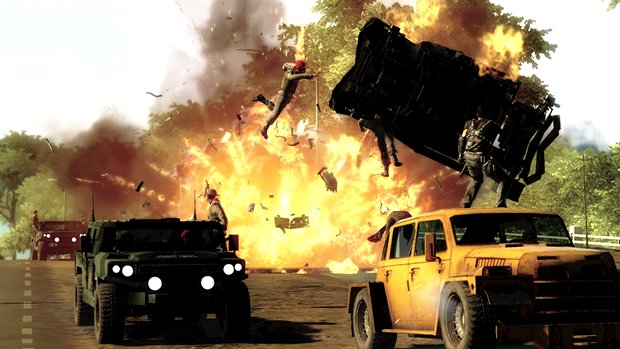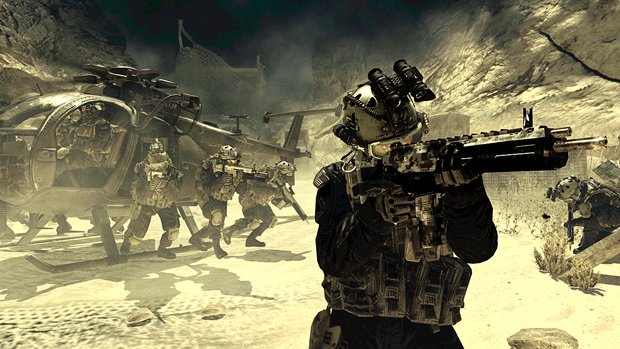Are the days of demos numbered?
Demos are risky and costly ventures, with some developers opting out
Game demos are about whetting the appetite, some say. If that's true, then Just Cause 2's was an all-you-can-eat buffet. You got to gorge on 35 square miles of the Lautan Lama Desert for a joyous 30 minutes at time. Over two million copies of the demo were downloaded, resulting in 2.5 million headshots and a million drivers kicked from vehicles, according to the developer's stats. Someone even made a mod for the demo.

Above: Just Cause 2's demo was robust and generous
For the game's creators, delivering this wasn't a piece of cake – the devs started work on the demo five months before the game's launch. "A demo the size and complexity of Just Cause 2's is a major investment and a separate release in its own right, with its own budget, project plan, and commercial targets," says Chris Dillon, Just Cause 2 producer at Square Enix London Studios. "Investing resources and time to develop the demo is just the start. On top of that are focus group studies, where we test builds to see how players react to our design decisions. Demos also need to go through the same localization and quality assessment processes as the main game."
Just Cause 2's demo was as ludicrously ambitious as the finished product. It paid off too, as the game went on to chart success. Yet some developers have been questioning the merit of demos. Cevat Yerli, Crytek's CEO, has called them obsolete and prohibitively expensive. AAA-titles like Modern Warfare 2 and Gears of War didn't have demos, and Rockstar rarely releases them. "I think demos are necessary for a new intellectual property, I'm not sure they are for a sequel," says videogame analyst Michael Pachter. "FIFA 11: do you really care? You've played FIFA before, you understand the concept. It's a good way to generate buzz but occasionally demos destroy the game. It's a double-edged sword. If the demo is amazing – and people say it's the best thing they've ever played – then it helps."

Above: Modern Warfare 2 - no demo needed
Or does it? In 2008,Electronic Entertainment Design and Research (EEDAR) surveyed games released on the Xbox 360 and PlayStation 3, and found those with the biggest sales had no demos. Geoffrey Zatkin, president and COO of EEDAR, reckons the trend is much the same for PC titles. "Demos are hard to make because you're being asked to provide a working version of a game before it's finished," he says.
"In practice, people that could be finishing the game are pulled off development to make the demo. This usually involves kludging code and art, most of which has to be ripped out later to do it properly. Trailers are powerful because they are considerably cheaper to produce and are guaranteed to show the game experience you want. Almost any game can be made to look exciting in a trailer. Not every demo will be exciting when played."
Weekly digests, tales from the communities you love, and more
So an underwhelming demo can harm a game's reputation. The Aliens vs Predator demo was lambasted for being multiplayer only, Bionic Commando's deathmatch demo baffled players thanks to it lacking a tutorial, while Bad Company 2's demo angered some before it even began, after EA asked players for their email address.

Above: AvP's demo faced some serious hate
EA, meanwhile,is reportedly planning to charge for longer demos, or "premium downloadable content" (PDLC) as their marketing people label them. "I think most consumers will balk at spending money on a game demo," says Zatkin. "This might work for high-profile projects – the next Halo, StarCraft, Call of Duty etc. – but for a majority of the industry, it's hard to get people to pay to look at your promotional material. That said, we might see a lot more short games coming out with an episodic business model. This would allow publishers to sell a portion of the game at a lower price point and, if there is consumer interest, fund the next few chapters of the story and see if people continue to buy it."
EA claimsits PDLC will be a large portion of a game, as opposed to a traditional demo – a concept that is hardly new. In the early ’90s, 3D Realms and id Software pioneered shareware, in which you could get a chunk of a game for free before buying the full product. The shareware version of Doom – Knee-Deep in the Dead – came with nine levels, while in recent times Portal's aperitif featured 11 of the game's levels.
Rather than charging, other demos use clever tactics to make you commit to a full purchase. Some indie games let you play for an hour, then charge for unlocking the rest of the game; Dragon Age: Origins released a character creator demo that hooked up with the purchased game. The most effective demos, say Zatkin, are all about timing.

Above: Money makes the gaming world go around. But are demos always a wise investment?
"EEDAR has been recommending, for some time, that publishers and developers should consider releasing a demo post-release," he says. "Making a demo for a finished game is much easier to do. Time that would have been spent making the demo can be spent making the game better: more polish, more bug fixes, more features, etc. The quality of a demo made from the finished game is almost always higher than the quality of a demo made from an incomplete game." A tuned BioShock demo, for example, was released a few days before the game and broke records for demo downloads.
Despite Cevat Yerli's predictions, demos aren't going away any time soon. Programmer Chad Walker, veteran of titles such as Age of Empires II and author of the book Making a Game Demo: From Concept to Demo Gold, says demos are crucial for industry events like E3, for marking development milestones, testing betas, and much more.Walker views Modern Warfare 2's lack of demo as the exception, not as the rule.
"I believe there is now more of a need for demos than ever," he says. "Call of Duty first came out in 2003 and up until now has released 10 titles, with seven years of marketing, community growth and expansion. Also, if you look back on previous Call of Duty releases, they had their fair share of demos to get the public interested and accepting of the game. Their latest non-demo release was just as much about marketing hype as releasing a demo. Remember, they didn't need to raise awareness, grow a community or push a new IP through. They simply needed to meet and exceed expectations."


